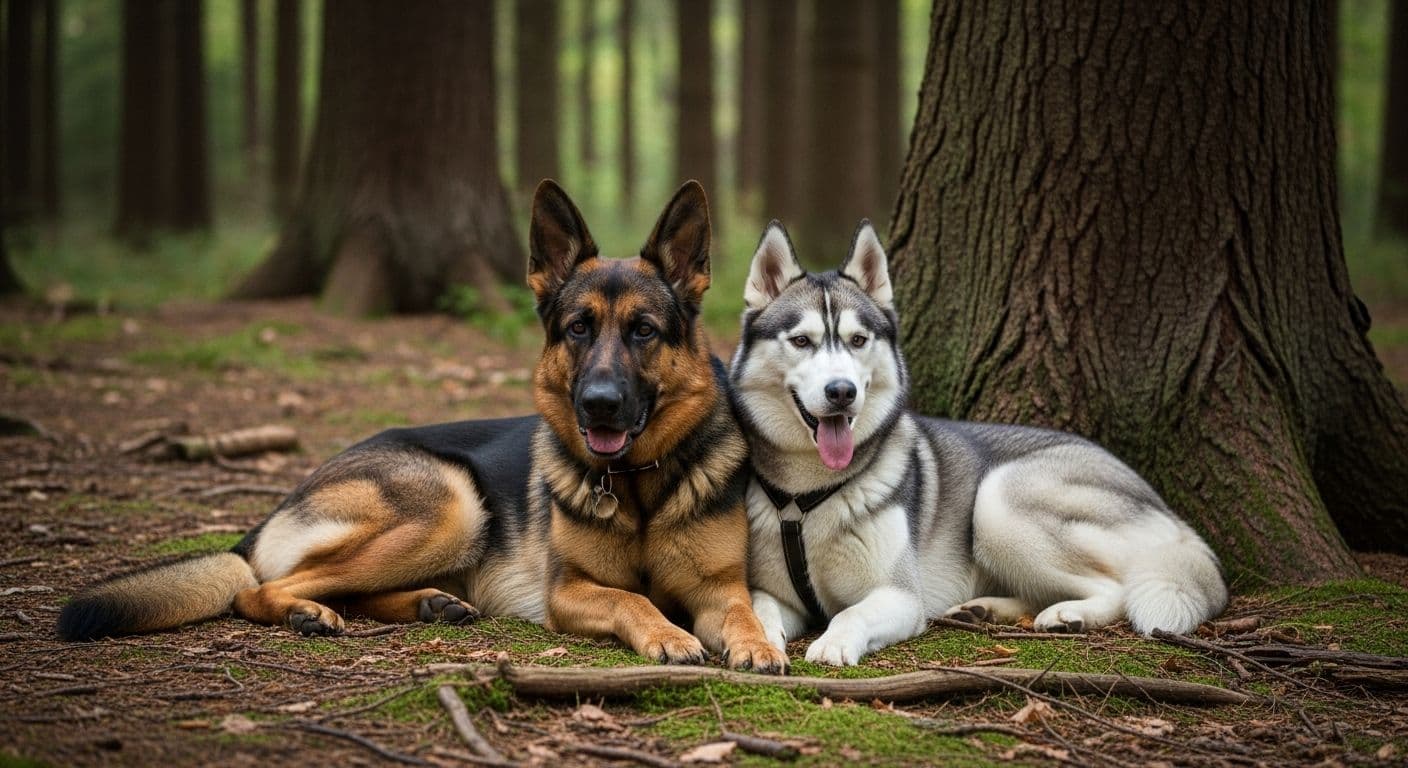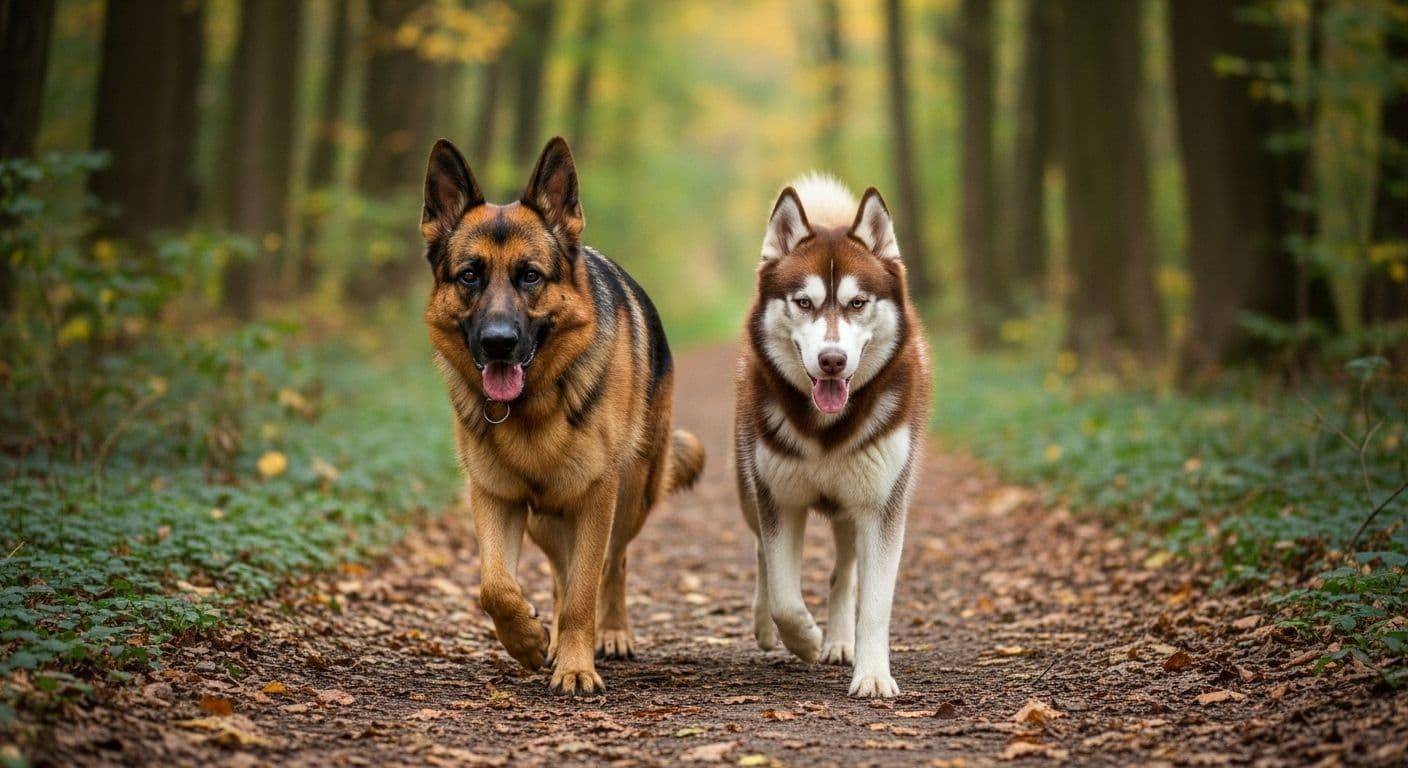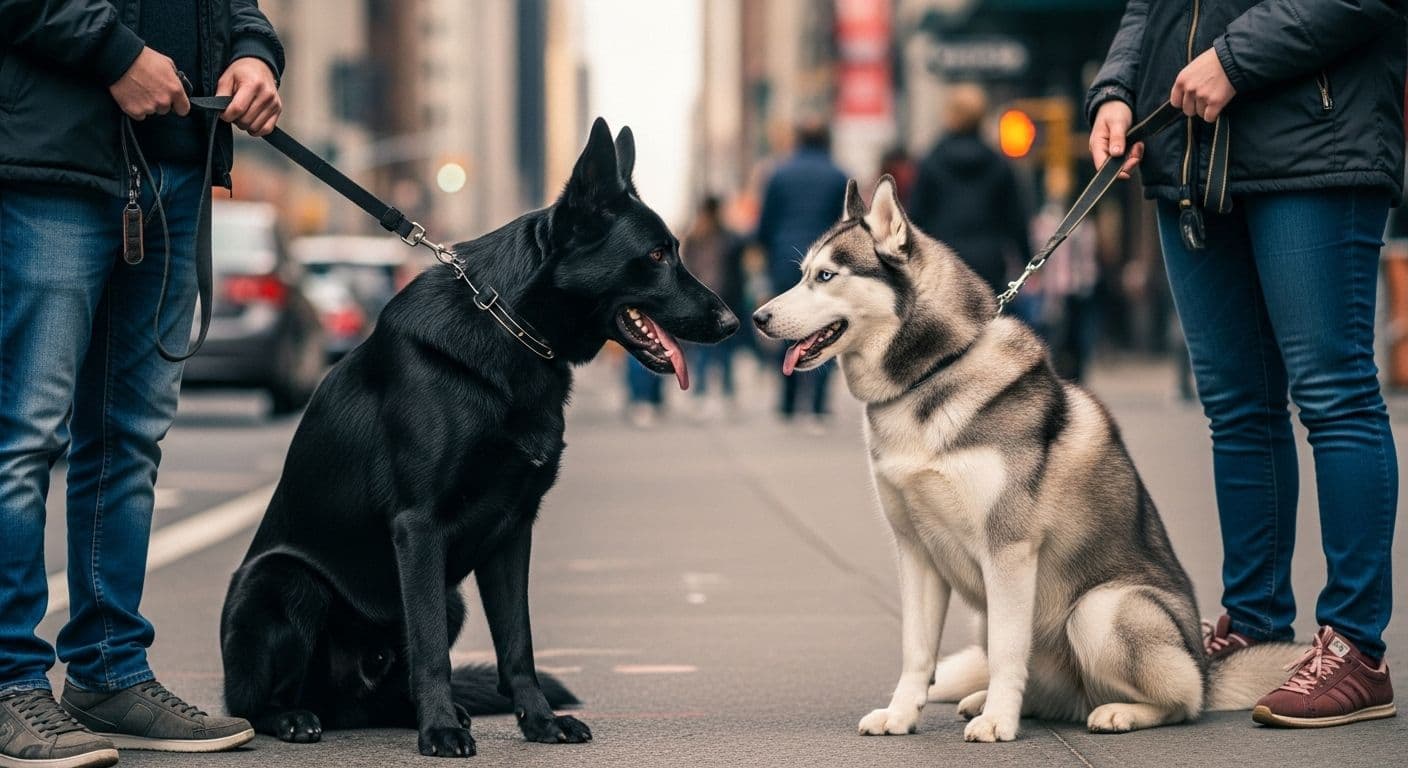Welcoming a dog isn’t a weekend whim—it’s a decade (or more) of muddy paws, early-morning walks, and couch cuddles. So it makes sense to line up the german shepherd and husky, study their similarities, peek at their differences, and decide which option—purebred, husky shepherd mix, or another german shepherd mixture—will actually fit your lifestyle. Ready to find out which set of paw prints belongs on your living-room rug? Let’s dive in.
German Shepherd and Husky at a Glance
Origins & Purpose
German Shepherds were fine-tuned in late-1800s Germany for herding, then promoted to superstar status in police and military work. They’re hard-wired to problem-solve and protect.
Siberian Huskies, on the other hand, travelled with the Chukchi people of northeast Asia, pulling sleds during the day and warming feet at night. Their job description still reads: “Run long distances. Play well with others.”
Size & Build
- Average height: 22–26 in (Shepherd) / 20–24 in (Husky)
- Average weight: 50–90 lb (Shepherd) / 35–60 lb (Husky)
- Typical coat: Double, weather-proof, built for blizzards—and yes, for shedding all over your black leggings.
Quick Pros & Cons
- German Shepherd
- Pros: Eager to learn, fiercely loyal, versatile worker
- Cons: Year-round shedding, prone to hip issues, needs mental workouts
- Siberian Husky
- Pros: Social, athletic, generally healthy
- Cons: Houdini escape skills, selective hearing, seasonal fur explosions
Combine them and you meet the shepherd husky mix, often called the Gerberian Shepsky—a mid-sized dazzler with ice-blue or amber eyes and a personality that’s equal parts goofball and guardian.
Temperament & Personality Traits

Loyalty vs. Friendliness
A German Shepherd glues itself to its people and keeps a polite distance from strangers. A Husky? Everybody’s buddy, complete with karaoke-level howling. Place both in a husky and german shepherd hybrid and you’ll likely get a dog that warns you someone’s at the door, then happily soaks up scratches once you give the okay.
Trainability & Intelligence
Shepherds learn commands fast and love checking tasks off their mental to-do list. Huskies can learn just as quickly but often ask, “What’s in it for me?” before performing. The middle ground—the husky shepherd puppy mix—usually means a sharp mind plus a playful streak. Keep sessions short, upbeat, and reward-heavy, and you’ll see fireworks in the best way.
Social Dynamics
Dog-park dreams? Small-pet roommates? Early socialization is non-negotiable. Both breeds carry prey drive—shepherds toward livestock, huskies toward anything that zips. Introduce cats, rabbits, or smaller dogs under calm, controlled settings and reinforce good choices. Guardian tendencies jump a notch in a german shepherd husky wolf mix or german shepherd husky pitbull mix, so confident leadership from day one is the secret sauce.
Appa the Husky and Arlo the German Shepherd have an argument
Exercise, Training & Mental Work
Daily Energy Budget
Neither breed was built for Netflix binges. Pencil in 90–120 minutes of action every day. Break it up: a sniff-filled walk before work, a backyard agility run at lunch, and bike-joring or fetch as the sun drops.
Great outlets include:
- Agility or rally-obedience—structured puzzles in motion
- Canicross, skijoring, or bike-joring—think “I pull, you glide”
- Advanced scent work—perfect for that Sherlock-level shepherd brain
Backyard Isn’t Enough
A fenced yard helps, but purpose outweighs square footage. A bored shepherd remodels drywall; a bored husky scales six-foot fences. Rotate toys, hide treats, teach a new trick each week, and invite your dog along on errands. Mental fatigue is your golden ticket to a snoring german shepherd husky by 8 p.m.
Training Milestones
- Recall—because squirrels exist.
- Loose-leash walking—60 pounds of sled-pulling power can drag even gym regulars.
- Settle cue—helps excitable pups relax at breweries or family picnics.
- Crate comfort—a lifesaver for travel, vet stays, and rainy-day downtime.
Grooming & Health

Shedding Forecast
Both breeds “blow” their undercoats twice a year. During these snowstorms of fur, daily brushing prevents your home from turning into a fuzzy slip-n-slide. The rest of the year, three sessions a week with a slicker brush and undercoat rake do the trick.
Bathing & General Care
- Baths: Every 6–8 weeks—or sooner if your explorer discovers mud.
- Ears: Check weekly; debris hides in those semi-upright ears.
- Nails: Trim bi-weekly; pavement walks will help but not replace clippers.
- Teeth: Brush at least three times a week—doggy breath isn’t romantic.
Common Health Concerns
- Hip & elbow dysplasia: More common in shepherd lines
- Degenerative myelopathy: Watch for rear-end weakness in seniors
- Eye disorders: Cataracts and PRA run in husky DNA
- Bloat: Deep-chested shepherd bodies equal higher risk—feed two or three smaller meals
Feed a high-quality diet with real meat first, add joint supplements like glucosamine, and schedule annual vet screenings. With solid care, most mixes enjoy 12–14 years of adventure.
Living With a Shepherd Husky Mix
Housing & Climate
Apartment life works only if exercise quotas are met and neighbors won’t complain about husky serenades. Suburban homes with 6-foot fences are ideal. Double coats thrive in cool climates; in hot zones, walk at dawn, provide shade, and set up a kiddie pool for splash breaks.
Family Compatibility
Kids over eight blend best—big dogs can accidentally topple toddlers. Seniors or laid-back households might struggle with the workout demands. As for other pets, a slow introduction paired with firm supervision usually keeps the peace, especially with medium-to-large dogs. Pocket pets? They’ll appreciate a secure, separate space.
Alone Time Tolerance
Left solo too long, a husky mix writes its own mischief novel while a shepherd scripts anxiety episodes. Start small—fifteen-minute outings, puzzle feeders, a worn T-shirt that smells like you—and build up. If you work nine-to-five, consider a midday dog walker or dog-daycare.
Buying or Adopting: Finding the Right Dog

Ethical Sources
A quality breeder or rescue wants the same thing you do—a healthy, happy dog in a forever home. Look for:
- Health testing—hips, elbows, eyes, DNA panels
- In-home puppy raising—not a backyard shed
- Lifetime take-back policy—responsible breeders never truly “sell and forget”
Breed-specific rescues often list adult shepherd husky mix for sale or adoption with fees under $400—far less than most german shepherd husky mix puppies for sale ads.
Cost of Ownership
- Initial expenses
- Vaccines & microchip: $250–$400
- Spay/neuter: $200–$600
- Recurring yearly budget
- Food (quality kibble + toppers): $700–$1,000
- Preventive vet care: $300–$500
- Grooming tools & supplies: $100
- Training classes & activities: $300–$600
Budget realistically; the real price tag stretches well beyond that “german shepherd husky mix for sale” headline.
Red Flags to Avoid
- Puppies shipped or handed off before eight weeks
- No proof of deworming or vet checks
- Seller refuses to show mom, dad, or living conditions
- Bargain-basement pricing with high-pressure sales tactics
Walk away—your future dog, and your wallet, will thank you.
Final Thoughts
Choosing between a german shepherd and husky—or staking everything on a dazzling shepherd husky mix—comes down to matching energy levels, grooming tolerance, and training enthusiasm with your daily reality. Put in the effort, and you’ll earn a decade of companionship, laughter, and stories that start with, “Remember that time the dog…?”
Visit breeders, meet rescue dogs, ask questions, and listen to your gut. When the right tail thumps against your leg, you’ll know those shed-covered car seats and sunrise jogs are a small price to pay for a lifetime of loyalty.



